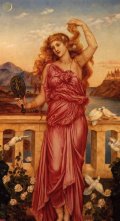
Worksheets and No Prep Teaching Resources
Reading Comprehension Worksheets
Ancient Greece

Ancient Greece
 Worksheets and No Prep Teaching Resources Reading Comprehension Worksheets Ancient Greece |
 Ancient Greece |
| edHelper's suggested reading level: | grades 4 to 6 | |
| Flesch-Kincaid grade level: | 5.8 |
|
The Iliad and the Odyssey, Part 1
By Vickie Chao |

|
 1 Homer was the most famous poet in the whole of ancient Greece. But he was a mysterious man, too. For centuries, scholars had no idea exactly when he lived or where he was from. They could not even agree on whether he had actually existed at all! Despite the lingering questions, historians traditionally credit Homer with writing the two greatest epic poems of ancient Greece. They said that he wrote the Iliad and the Odyssey. The Iliad (pronounced "IL-ee-ud") has 24 books and 16,000 lines. It describes vividly the final days of the Trojan War and introduces a character called Odysseus. The Odyssey (pronounced "AHD-ih-see") also has 24 books. But it is shorter, with only 11,300 lines. The Odyssey is like a sequel to the Iliad, for it centers on Odysseus and his struggle to get back home after the Trojan War.
1 Homer was the most famous poet in the whole of ancient Greece. But he was a mysterious man, too. For centuries, scholars had no idea exactly when he lived or where he was from. They could not even agree on whether he had actually existed at all! Despite the lingering questions, historians traditionally credit Homer with writing the two greatest epic poems of ancient Greece. They said that he wrote the Iliad and the Odyssey. The Iliad (pronounced "IL-ee-ud") has 24 books and 16,000 lines. It describes vividly the final days of the Trojan War and introduces a character called Odysseus. The Odyssey (pronounced "AHD-ih-see") also has 24 books. But it is shorter, with only 11,300 lines. The Odyssey is like a sequel to the Iliad, for it centers on Odysseus and his struggle to get back home after the Trojan War. |
Create Weekly Reading Books
Prepare for an entire week at once! |
| Leave your feedback on The Iliad and the Odyssey, Part 1 (use this link if you found an error in the story) |
 |
Ancient Greece
|
 |
Social Studies
|